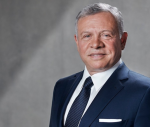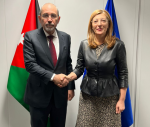You are here
Lebanon is victim of its deeply entrenched political elite
Jun 17,2020 - Last updated at Jun 17,2020
Lebanon is the victim of its deeply entrenched political elite, which has refused to adopt and execute meaningful reforms since tens of thousands of Lebanese poured into the streets last October to demand an end to mismanagement, corruption and the country's sectarian system of governance.
Instead of meeting protesters' increasingly urgent demands, the politicians have stalled and squabbled among themselves while the poverty rate rose to the point that Lebanese families are facing hunger because they cannot afford rising cost of foodstuffs. Protests have become increasingly violent, particularly in the northern port city of Tripoli and its hinterland.
The current weak technocratic government has been negotiating with the International Monetary Fund (IMF) for $9 billion in financial support although the fund is infamous for reducing subsidies and programmes benefitting the poor as the price of aid. There is no safety net in Lebanon for people who lose their livelihoods. The Lebanese middle class is disappearing, either by slipping into poverty or emigrating.
Because of the politicians' failure to develop and implement a comprehensive reform plan, international donors have refused to release $11 billion in loans and grants pledged at a meeting in Paris in 2018.
Last week, the Brussels-based International Crisis Group called for emergency aid and urgent reform to rescue hard-pressed Lebanese from catastrophe. "The economic crisis is without precedent in the country's history," the group said and urged Beirut to speed up negotiations with the IMF and international donors in order to take delivery of funds to halt the precipitous downward slide. Until this happens, the think tank demanded humanitarian assistance to keep the wolf of hunger from the doors of Lebanese family homes.
Lebanon's economy went into free fall last September, prompting the protests which paused for a few weeks during the country's successful anti-coronavirus campaign involving strict lockdown, curfew and other restrictions. Lebanon had no choice but to clamp down hard as its health sector does not have the means to contain the virus with mass testing and tracing or to treat thousands of victims.
Meanwhile, the economic crisis continued. The country's currency plunged in value from 1,507 to 4-5,000 the US dollar. Imports of food and other goods were cut, prices rose, businesses closed and tens of thousands had reductions in salaries or lost jobs. Lebanon defaulted for the first time ever a Eurobond loan payment.
Instead of using the brief respite from protests to cobble together a serious reform plan, the politicians bickered, procrastinated and prevaricated. An ex-minister told this correspondent that rather than Covid-19 they fear reform involving accountability for mismanagement and graft.
The Crisis Group argued there must be "structural change [that] will put an end to the political model in which corrupt and self-serving cliques appropriate and redistribute state resources and public goods”. Rightly, the group questioned whether the politicians would "oversee a transition", which would involve “‘pulling out the rug from their own feet’." Indeed, this has been Lebanon's problem all along.
Lebanon's challenged Prime Minister Hassan Diab has announced the launch of a "war on corruption" in response to the demands of the street. He said the government would not be deterred by their "political, religious, sectarian, regional and familial covers". But, few Lebanese believe the authorities can actually prosecute members of the elite and retrieve billions of dollars residing in foreign banks.
To make matters worse, largely peaceful protests which had involved Lebanese from all backgrounds and faiths have been increasingly disrupted by violent trouble makers defending the sectarian status quo which has inflicted two civil wars and continues to wreak so much damage on the country. Diab has accused these elements of mounting an "organised sabotage campaign".
Lebanon's crisis has spilled over into sanctioned and war-battered Syria. Last week, President Bashar Assad dismissed Prime Minister Imad Khamis after rare protests erupted in the government-controlled south. Water resources minister Hussein Arnous was appointed in his place to prepare for elections on July 19.
Ahead of fresh US sanctions targeting anyone dealing with Syria's government, the Syrian pound plunged on the black market, trading at 3,000-5,000 to the US dollar rather than the official rate of 700. As in Lebanon, hunger has become a major issue for some 10 million Syrians.
The situation prompted the World Food Programme to send a convoy of 39 truckloads of food aid to Syria. Food has become more expensive than at any time during the country's civil and proxy war.
Protests erupted in Sweida, the homeland of the traditionally loyal Druze minority, and spread to the neighbouring province of Deraa, where, in 2011, unrest launched nine years of strife. Both provinces are beset by lawlessness and attacks by Daesh and other takfiri factions as well as afflicted by economic melt-down.
While Damascus' Druze supporters promptly retaliated by mounting their own rally, the potential defection of this minority would be a major blow to Damascus as Syria's Druze, Alawite and Christian minorities have backed the government from the outset of the troubles, while the Kurds have not joined its opponents. Residents of the Kurdish and takfiri controlled zones are also suffering from the currency's collapse and high prices. In north-western Idlib province held by Al Qaeda-linked takfiris, the weak Turkish pound has replaced Syria's currency.













